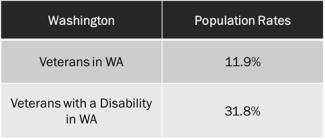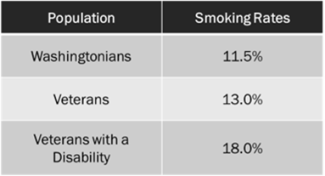On March 6th, 2024, Paul Caseley, program manager for WDVA’s Veteran Commercial Tobacco Cessation Program, presented at the Centers for Disease Control and Prevention’s (CDC) Office of Smoking and Health (OSH) Awardee Meeting in Atlanta, GA.
With grant funding from the CDC’s Office on Smoking and Health through the Washington State Department of Health, your Washington State Department of Veterans Affairs is the Lead Agency to address disparities and health equity issues around tobacco and nicotine use with veterans in Washington State.
The 3-day conference, “Approaching the Fifth Year: Showcasing and Synthesizing Our Progress” brought together commercial tobacco control professionals from the United States, Washington, D.C., Puerto Rico, and Guam to review expectations and requirements for the fifth year of the cooperative agreement, showcase program progress and innovation, and develop meaningful connections in support of successful implementation of the National and State Tobacco Control Program.

Specifically, the meeting focused on the value of real-world examples of policy, systems, and environmental (PSE) change strategies and activities to address the four National Tobacco Control Program (NTCP) goals:
- Prevent initiation of commercial tobacco use among youth and young adults.
- Eliminate exposure to secondhand smoke.
- Promote quitting among adults and youth.
- Advance health equity by identifying and eliminating commercial tobacco product-related inequities and disparities.
WDVA’s joint presentation with the Washington State Department of Health: Looking Back: Reflections and Highlights Addressing Tobacco Cessation for Veterans was part of a state showcase highlighting WDVAs work to increase tobacco cessation services for veterans and resource awareness for providers of services to veterans. The session was attended by approximately 40 individuals from various state tobacco prevention and control programs, as well as CDC staff.
North Carolina Tobacco Prevention and Control Branch followed WA State’s presentation with: Expanding the Fight for Military Health: A Roadmap for Effective Military, Academic, and Local Public Health Partnerships and highlighted that agency’s work and partnership with Ft. Liberty, formerly Ft. Bragg, NC, which addressed how military, civilian, and academic public health partnerships can extend and improve public health services for a military community; explained the importance of working with military installations to reduce tobacco use and the equity impact it has on communities; and identified strategies used to influence tobacco prevention and control on military installations.
Health Equity and Disparities
Improved tobacco cessation (for veterans) will advance health equity by addressing disparities associated with cigarette smoking, secondhand smoke exposure, and access to treatment, ultimately reducing the burden of smoking-related disease. These disparities are driven by social and structural factors which make it easier for someone to start smoking or harder to quit. For example, stress related to issues like discrimination or poverty, or tobacco-product marketing targeted to specific population groups, contribute to tobacco-related disparities. These disparities may be compounded by lack of access to tobacco cessation services and smoke-free air.
Service members and military veterans have higher rates of tobacco and nicotine product use than the general population and more than a third of all active-duty smokers in the military start smoking after they enlist. Individuals with military or veteran status and their families have unique challenges and barriers to successfully quit tobacco-use, such as frequent moves, deployment, and often physical and behavioral health issues linked to their military service. These challenges and barriers often remain for individuals long after their transition from the military to civilian life. Historically, the military community has been targeted by tobacco companies for marketing and shipping free cartons of cigarettes to deployed military units overseas. Cigarette smoking is more common among service members who have been deployed overseas.
While multiple upstream interventions are needed to prevent and eradicate these veteran tobacco-related disparities, ease of access and effective delivery for tobacco cessation services may help reduce these disparities. Additionally, successful quitting may require tailoring of services and supports to be culturally adapted for veteran cultural competence. Seven out of every 10 Veterans who smoke would like to quit — for both the physical benefits and their mental health.
Cigarette smoking increases your risk for lung cancer, heart disease, chronic bronchitis, and many other diseases, and is the number one preventable cause of disease and death in the United States and around the world.
Washington State is home to approximately 550,000 veterans with 20-30% in each of the 39 counties being registered with the Veterans Health Administration receiving compensation for service-connected disabilities or pension benefits. Other veterans receive health benefits offered by their employer, private insurance, state sponsored health insurance, or have no health insurance benefits. The veteran population with disabilities in Washington is 31.8% and the smoking rate for veterans jumps from 13% to 18% for veterans with disabilities.
Data from BRFSS (2021), Center of Disease Control & Prevention (2019), and Wang, Z. J. et al., (2021)
Streamlining and increasing access to tobacco cessation services for all veterans including counseling coupled with the use of Nicotine Replacement Therapy (NRT) products – gum, patches, lozenges, and other medications is critical to reducing the burden of cigarette smoking and nicotine addiction with our nation’s veterans.
WDVAs Veteran Commercial Tobacco Cessation Program (active link to webpage)
Goals
- Understand the needs of Veterans around tobacco cessation and promote cessation efforts.
- Develop strategies and activities which seek to improve health equity and address community disparities.
- Establish programs that address commercial tobacco use and nicotine addiction for Veterans with disabilities.
- Collaborate with local, statewide, and national organizations that work with Veterans to enhance programs and efforts already in place, develop education protocols, deliver training to service providers, and provide resources for veterans and their families around tobacco cessation.
Services Available
- Tobacco/Nicotine Use Assessment (No Cost)
- Treatment Plan Recommendations
- Medication Recommendations & Education
- Regular Follow Up Coaching & Counseling
- In Person/Phone/Zoom
- FREE Nicotine Replacement Therapy (NRT) - Patches, Gum, Lozenges; up to 12 weeks.

More Veteran Resources for Kicking Tobacco & Nicotine Products
VA Health Administration Expert Dr. Jonathon Lee
U.S. Department of Veterans Affairs Tobacco Quitting Services
Quit VET (1-855-QUIT-VET, 1-855-784-8838) Speak to a tobacco cessation counselor between 9 a.m. and 9 p.m. Eastern time, Monday through Friday in English or Spanish. Quit VET connects Veterans to a trained counselor who can help develop a quit plan and provide ongoing counseling and support to prevent relapse.
2Morrow Health Our partners at 2Morrow Health and Washington State Dept. of Health, offer veterans free access to a unique cessation program delivered via a smartphone app.
FREE 2-week supply of patches, gum, or lozenges mailed to your address.
SmokefreeVET Receive texts with encouragement and support by texting VET to 47848. (For Spanish text VETESP to 47848). The benefits of signing up include regular text messages and tips when you text the keywords URGE, STRESS, or SMOKED.
Washington State Quitline and Online Cessation Services
Tips From Former Smokers (CDC)
References
Behavioral Risk Factor Surveillance System (Phone Survey)
BRFSS (2021), Center of Disease Control & Prevention (2019), and Wang, Z. J. et al., (2021)
Centers for Disease Control and Prevention/Military Service Members and Veterans
Webpage: https://www.cdc.gov/tobacco/campaign/tips/groups/military.html
Strategies to Improve Delivery of Tobacco Cessation Services
CMCS Information Bulletin, March 7, 2024
U.S. Department of Health & Human Services, Centers for Medicare & Medicaid
U.S. Department of Veterans Affairs
Webpage: Tobacco and Health Tobacco and Health - Mental Health (va.gov)



